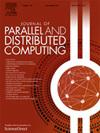Multi-ARCL: Multimodal adaptive relay-based distributed continual learning for encrypted traffic classification
IF 3.4
3区 计算机科学
Q1 COMPUTER SCIENCE, THEORY & METHODS
引用次数: 0
Abstract
Encrypted Traffic Classification (ETC) using Deep Learning (DL) faces two bottlenecks: homogeneous network traffic representation and ineffective model updates. Currently, multimodal-based DL combined with the Continual Learning (CL) approaches mitigate the above problems but overlook silent applications, whose traffic is absent due to guideline violations leading developers to cease their operation and maintenance. Specifically, silent applications accelerate the decay of model stability, while new and active applications challenge model plasticity. This paper presents Multi-ARCL, a multimodal adaptive replay-based distributed CL framework for ETC. The framework prioritizes using crypto-semantic information from flows' payload and flows' statistical features to represent. Additionally, the framework proposes an adaptive relay-based continual learning method that effectively eliminates silent neurons and retrains new samples and a limited subset of old ones. Exemplars of silent applications are selectively removed during new task training. To enhance training efficiency, the framework uses distributed learning to quickly address the stability-plasticity dilemma and reduce the cost of storing silent applications. Experiments show that ARCL outperforms state-of-the-art methods, with an accuracy improvement of over 8.64% on the NJUPT2023 dataset.
Multi-ARCL:基于多模态自适应中继的分布式持续学习,用于加密流量分类
基于深度学习(DL)的加密流量分类(ETC)面临两个瓶颈:同质网络流量表示和无效的模型更新。目前,基于多模式的深度学习与持续学习(CL)方法相结合缓解了上述问题,但忽略了静默应用程序,由于违反指导方针导致开发人员停止其操作和维护,其流量缺失。具体来说,沉默应用加速了模型稳定性的衰减,而新的和活跃的应用挑战了模型的可塑性。本文提出了基于多模态自适应重播的分布式CL框架Multi-ARCL。该框架优先使用来自流的有效负载和流的统计特征的加密语义信息来表示。此外,该框架提出了一种基于自适应继电器的持续学习方法,该方法有效地消除了沉默神经元,并重新训练了新样本和旧样本的有限子集。在新任务训练期间有选择地删除沉默应用程序的示例。为了提高训练效率,该框架采用分布式学习,快速解决了稳定性-可塑性难题,降低了存储静默应用程序的成本。实验表明,在NJUPT2023数据集上,ARCL的准确率提高了8.64%以上。
本文章由计算机程序翻译,如有差异,请以英文原文为准。
求助全文
约1分钟内获得全文
求助全文
来源期刊

Journal of Parallel and Distributed Computing
工程技术-计算机:理论方法
CiteScore
10.30
自引率
2.60%
发文量
172
审稿时长
12 months
期刊介绍:
This international journal is directed to researchers, engineers, educators, managers, programmers, and users of computers who have particular interests in parallel processing and/or distributed computing.
The Journal of Parallel and Distributed Computing publishes original research papers and timely review articles on the theory, design, evaluation, and use of parallel and/or distributed computing systems. The journal also features special issues on these topics; again covering the full range from the design to the use of our targeted systems.
 求助内容:
求助内容: 应助结果提醒方式:
应助结果提醒方式:


